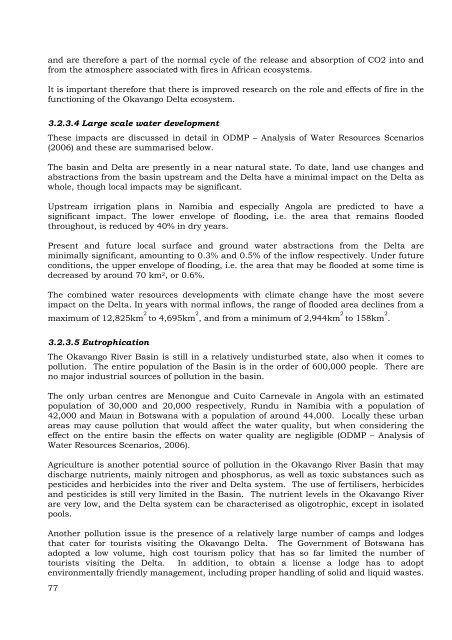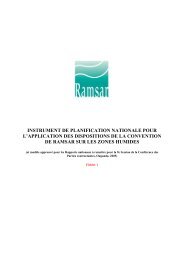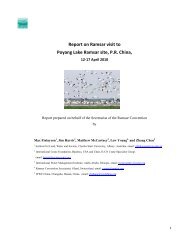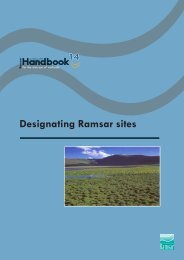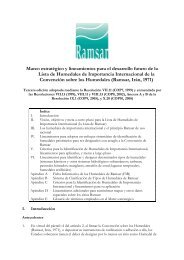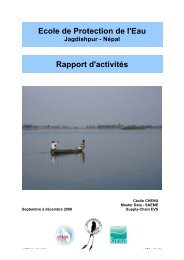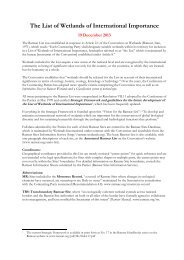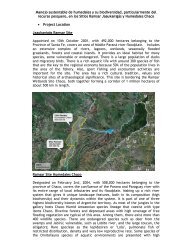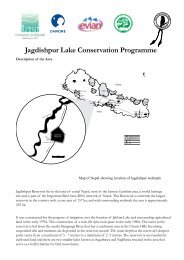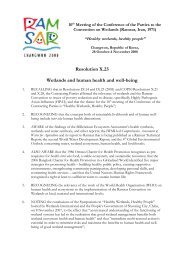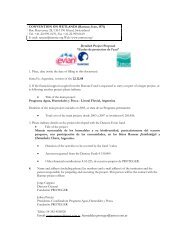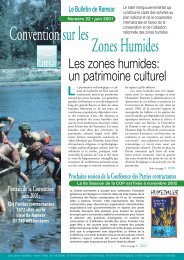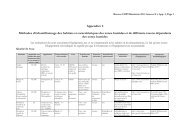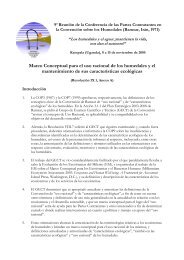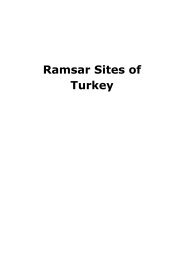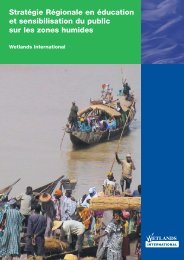Okavango Delta Management Plan - Ramsar Convention on Wetlands
Okavango Delta Management Plan - Ramsar Convention on Wetlands
Okavango Delta Management Plan - Ramsar Convention on Wetlands
Create successful ePaper yourself
Turn your PDF publications into a flip-book with our unique Google optimized e-Paper software.
and are therefore a part of the normal cycle of the release and absorpti<strong>on</strong> of CO2 into and<br />
from the atmosphere associated with fires in African ecosystems.<br />
It is important therefore that there is improved research <strong>on</strong> the role and effects of fire in the<br />
functi<strong>on</strong>ing of the <str<strong>on</strong>g>Okavango</str<strong>on</strong>g> <str<strong>on</strong>g>Delta</str<strong>on</strong>g> ecosystem.<br />
3.2.3.4 Large scale water development<br />
These impacts are discussed in detail in ODMP – Analysis of Water Resources Scenarios<br />
(2006) and these are summarised below.<br />
The basin and <str<strong>on</strong>g>Delta</str<strong>on</strong>g> are presently in a near natural state. To date, land use changes and<br />
abstracti<strong>on</strong>s from the basin upstream and the <str<strong>on</strong>g>Delta</str<strong>on</strong>g> have a minimal impact <strong>on</strong> the <str<strong>on</strong>g>Delta</str<strong>on</strong>g> as<br />
whole, though local impacts may be significant.<br />
Upstream irrigati<strong>on</strong> plans in Namibia and especially Angola are predicted to have a<br />
significant impact. The lower envelope of flooding, i.e. the area that remains flooded<br />
throughout, is reduced by 40% in dry years.<br />
Present and future local surface and ground water abstracti<strong>on</strong>s from the <str<strong>on</strong>g>Delta</str<strong>on</strong>g> are<br />
minimally significant, amounting to 0.3% and 0.5% of the inflow respectively. Under future<br />
c<strong>on</strong>diti<strong>on</strong>s, the upper envelope of flooding, i.e. the area that may be flooded at some time is<br />
decreased by around 70 km 2, or 0.6%.<br />
The combined water resources developments with climate change have the most severe<br />
impact <strong>on</strong> the <str<strong>on</strong>g>Delta</str<strong>on</strong>g>. In years with normal inflows, the range of flooded area declines from a<br />
maximum of 12,825km 2<br />
to 4,695km 2<br />
, and from a minimum of 2,944km 2<br />
to 158km 2<br />
.<br />
3.2.3.5 Eutrophicati<strong>on</strong><br />
The <str<strong>on</strong>g>Okavango</str<strong>on</strong>g> River Basin is still in a relatively undisturbed state, also when it comes to<br />
polluti<strong>on</strong>. The entire populati<strong>on</strong> of the Basin is in the order of 600,000 people. There are<br />
no major industrial sources of polluti<strong>on</strong> in the basin.<br />
The <strong>on</strong>ly urban centres are Men<strong>on</strong>gue and Cuito Carnevale in Angola with an estimated<br />
populati<strong>on</strong> of 30,000 and 20,000 respectively, Rundu in Namibia with a populati<strong>on</strong> of<br />
42,000 and Maun in Botswana with a populati<strong>on</strong> of around 44,000. Locally these urban<br />
areas may cause polluti<strong>on</strong> that would affect the water quality, but when c<strong>on</strong>sidering the<br />
effect <strong>on</strong> the entire basin the effects <strong>on</strong> water quality are negligible (ODMP – Analysis of<br />
Water Resources Scenarios, 2006).<br />
Agriculture is another potential source of polluti<strong>on</strong> in the <str<strong>on</strong>g>Okavango</str<strong>on</strong>g> River Basin that may<br />
discharge nutrients, mainly nitrogen and phosphorus, as well as toxic substances such as<br />
pesticides and herbicides into the river and <str<strong>on</strong>g>Delta</str<strong>on</strong>g> system. The use of fertilisers, herbicides<br />
and pesticides is still very limited in the Basin. The nutrient levels in the <str<strong>on</strong>g>Okavango</str<strong>on</strong>g> River<br />
are very low, and the <str<strong>on</strong>g>Delta</str<strong>on</strong>g> system can be characterised as oligotrophic, except in isolated<br />
pools.<br />
Another polluti<strong>on</strong> issue is the presence of a relatively large number of camps and lodges<br />
that cater for tourists visiting the <str<strong>on</strong>g>Okavango</str<strong>on</strong>g> <str<strong>on</strong>g>Delta</str<strong>on</strong>g>. The Government of Botswana has<br />
adopted a low volume, high cost tourism policy that has so far limited the number of<br />
tourists visiting the <str<strong>on</strong>g>Delta</str<strong>on</strong>g>. In additi<strong>on</strong>, to obtain a license a lodge has to adopt<br />
envir<strong>on</strong>mentally friendly management, including proper handling of solid and liquid wastes.<br />
77


